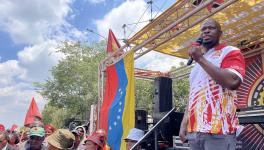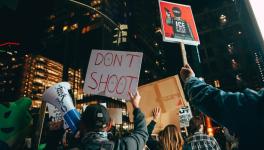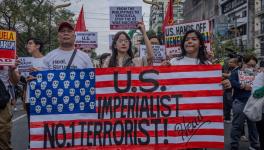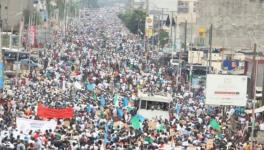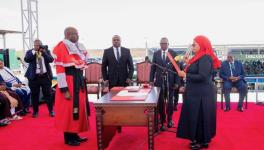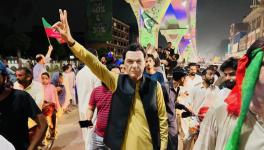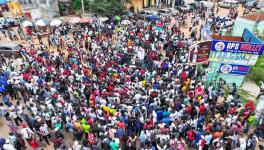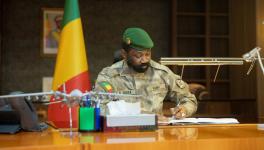Tanzania: Protests Erupt Amid Disputed Elections, Curfew
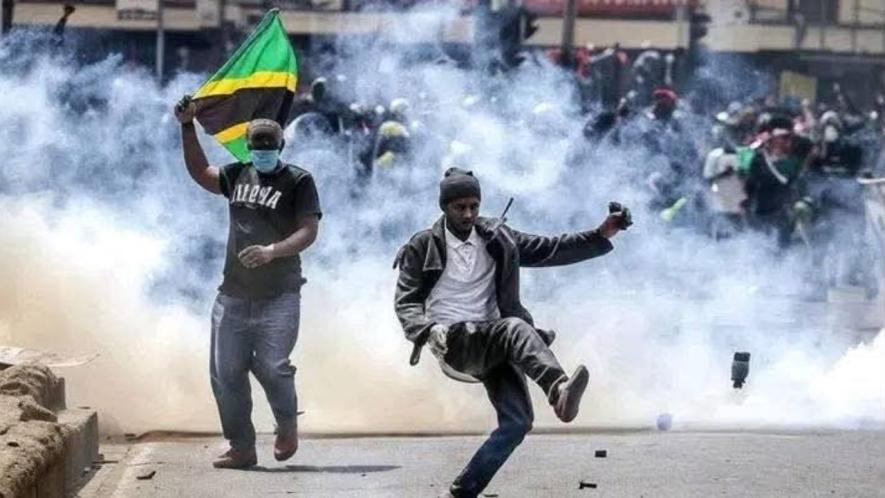
The Tanzanian Government has shut down internet services in the country and denied access to foreign reporters during elections The people are out in the streets protesting the "ceremonial" elections. Photo: X
Some of the regions in Tanzania descended into chaos following the country’s general elections on Wednesday, October 29, which many observers described as “ceremonial” rather than a contest. President Samia Suluhu Hassan, who became Tanzania’s first female head of state in 2021, was already the overwhelming favorite to win in an election devoid of meaningful opposition.
According to reports, the vote was marred by a nationwide internet shutdown, curfews, and unrest after protests broke out in parts of Dar es Salaam, reflecting widespread discontent over what citizens and regional observers have called a sham election.
Internet shutdown and curfew
Live network data from the internet observatory NetBlocks confirmed that Tanzania imposed nationwide internet restrictions early Wednesday morning, severely disrupting mobile data services and blocking access to social media platforms. The blackout coincided with the start of voting, signaling a deliberate move to suppress the flow of information.
By evening, the government imposed a nationwide curfew, urging students and civil servants to remain indoors for the following day. The restrictions came as images and reports of protests spread, despite the blackout, with demonstrators denouncing the exclusion of opposition parties and the continued detention of opposition leader Tundu Lissu, who is currently on trial for treason.
Opposition barred, democracy in decline
Both CHADEMA, the main opposition party, and ACT Wazalendo were barred from participating in the elections. Lissu, who had called for electoral reforms, was arrested earlier this year on what human rights groups have called trumped-up charges. His arrest, coupled with the systematic oppression and media censorship, has deepened fears of an authoritarian turn in Tanzania’s politics.
Reports from human rights organizations, including Amnesty International, describe the political climate as one of “repression, intimidation, and fear.” Amnesty’s recent publication titled “Wave of Terror Sweeps Across Tanzania” documents cases of enforced disappearances, torture, and unfair trials, primarily targeting critics of the regime. Opposition leaders and activists have also faced severe restrictions on their freedom of movement that have effectively prevented them from conducting normal political activities.
Targeting of religious leaders and civil society
The crackdown has extended to religious leaders who have spoken against government abuses. In June, the regime deregistered the Ufufuo na Uzima Church, led by Bishop Dr. Josephat Gwajima, citing alleged violations of the Societies Act. The move came just days after the bishop publicly condemned abductions and enforced disappearances.
Other clergy, including Bishop Benson Bagonza of the Evangelical Lutheran Church and Bishop Dickson Kabigumila, have reported threats or fled the country. Several religious figures, journalists, and political activists remain missing, with families demanding justice.
Regional reactions
The Kenya Human Rights Network issued a statement on Thursday, condemning the ongoing violations.
“We stand here as East African citizens, mandated by the fact that Jumuiya ni yetu (the community is ours). The tragic occurrences we are witnessing in Tanzania go against the very principles that underpin the East African Community,” the statement read.
“Borders will not limit our brotherhood and sisterhood. Injustice anywhere is a threat to justice everywhere.”
The group also noted that no credible international observation missions were allowed into Tanzania. Countries, including Belgium, Sweden, Germany, and Ireland withdrew their participation, while the United Nations Development Program (UNDP) is also not engaging in the electoral process. The African Union (AU) and East African Community (EAC) sent only symbolic delegations, drawing criticism for “legitimizing repression”.
Earlier this year, a delegation from Kenya that included Boniface Mwangi of Kenya and Agather Atuhaire of Uganda, were detained and later deported from Tanzania after attempting to go to Tundu Lissu’s trial. Mwangi and Atuhaire were later assaulted and subjected to torture during their detention.
A regional warning
There are concerns across East Africa that the Tanzanian crisis reflects a broader pattern of shrinking democratic space across the region.
The KHRC statement concluded – “Africans are rightfully outraged that the African Union, an institution meant to defend human rights, democracy, and the rule of law, has chosen silence over principle. It increasingly resembles a club of presidents shielding each other rather than protecting the people they claim to serve. The same betrayal is evident in SADC and the EAC. We are coming to the defense of Tanzanians and hereby give notice to Tanzania and all authoritarian regimes in the rest of East Africa and Africa. As despots regroup to oppress citizens, we, as the citizens, are similarly regrouping to reclaim our countries and our inherent freedoms.”
As of Thursday evening, Dar es Salaam remained tense under heavy police presence, with sporadic protests continuing despite the curfew. The official election results are expected to be announced in the coming days.
Courtesy: Peoples Dispatch
Get the latest reports & analysis with people's perspective on Protests, movements & deep analytical videos, discussions of the current affairs in your Telegram app. Subscribe to NewsClick's Telegram channel & get Real-Time updates on stories, as they get published on our website.









